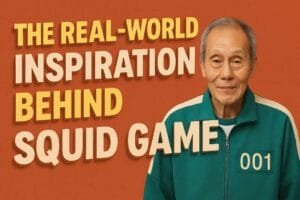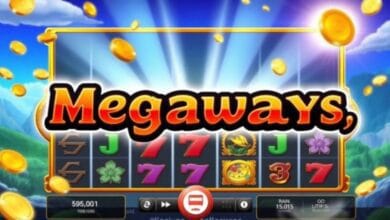Is Squid Game Based on a True Story or Inspired by Real Events

Introduction: Is Squid Game Based on a True Story
Since its explosive debut, Squid Game has become a worldwide sensation. Millions were captivated by its violent games, desperate players, and eerie graphics, which raised the main question: Is Squid Game based on a real-life event or is it entirely fictional? The answer is trickier than it seems. The show heavily references real-life economic hardships, societal trauma, and human desperation, even though it does not directly recreate any one historical event.
This post will reveal the source of Netflix’s worldwide renown, dissect what is real and what isn’t, and explain why so many people think it might actually happen.
The Real-World Inspiration Behind Squid Game

Despite not being a true documentary, Squid Game is based on true events, social issues, and individual experiences. The idea was first developed by series creator Hwang Dong-hyuk in 2009, when South Korea was experiencing a recession. Hwang’s own financial difficulties and high debt levels at the time were similar to those of many of the characters he would later develop.
Here is a comparison of Squid Game’s fiction and reality:
| Element in Squid Game | Fiction or Reality | Real-World Reference or Basis |
| Deadly children’s games | Fiction | Inspired by traditional Korean games, but no such lethal competition exists |
| 456 desperate players | Fiction | Symbolic representation of mass societal debt and inequality |
| Organ harvesting subplot | Fiction | Based on real black-market rumors, but dramatized for effect |
| VIPs betting on human lives | Fiction | Inspired by inequality and exploitation, not based on a real organization |
| Hwang’s personal debt | Reality | The creator was deeply in debt when he wrote the first draft |
| SsangYong Motor Strike (2009) | Reality-Inspired Element | Real labor strike that involved layoffs, violence, and tragedy in South Korea |
| Brothers’ Home abuse rumors | Thematic Echoes | Not directly linked but shares themes of abuse and dehumanization |
The table illustrates how the show combines fiction with unsettling realities, reflecting actual suffering and social injustice through exaggeration, metaphor, and allegory.
Economic Desperation: The Foundation of Squid Game
The central theme of the show is inequality and debt. Among developed nations, South Korea has one of the highest ratios of household debt. Many citizens, especially young people, struggle with crippling student loan debt, high housing costs, and stagnant wages. It’s a worldwide problem, not just a Korean one.
In interviews, creator Hwang Dong-hyuk stated that he based the characters on friends, neighbors, and even himself. Everybody knows someone who is having financial difficulties. Many viewers can relate to the idea of people who are so desperate that they would risk their lives for money.
Childhood Games Turned Deadly: A Cultural Twist
The use of innocent children’s games as tools of death is among Squid Game’s most startling features. In Korean schoolyards, games like “Red Light, Green Light” and the aptly named “Squid Game” were popular. By transforming them into instruments of execution, viewers are left with a spooky, unsettling contrast.
Hwang employed these games to represent how society taints innocence in addition to their shock value. In adulthood, what begins as play turns into a lethal competition, reflecting how happiness in the real world is transformed into a struggle for survival.
Real Tragedies: The 2009 SsangYong Motor Strike
Hwang has publicly acknowledged that the 2009 SsangYong Motor labor strike served as one of his inspirations. Employees protested for 77 days after the automaker laid off over 2,600 workers. Workers and riot police engaged in a violent altercation that resulted in injuries, arrests, and permanent trauma.
Many of those laid-off employees experienced depression and debt. Some even committed suicide. This tragic conclusion deeply impacted South Korea’s collective memory and served as the inspiration for Squid Game’s depiction of social abandonment and hopelessness.
Is There a Real Squid Game Tournament?
No. Fortunately, there isn’t a known death-themed Squid Game competition in real life. Nonetheless, many people who live in poverty or under a lot of stress can relate to the characters’ emotional reactions—their desperation, their motivations, and their moral breakdowns.
Curiously, for marketing purposes, Netflix and other businesses have since produced non-lethal real-life versions of the game. The violent reality of the show is not reflected in these promotional events.
The Global Appeal of Squid Game’s Message
Why does the show ask, “Is Squid Game based on a true story?” —its universal message is so poignant. No matter where you live, a lot of people are aware of:
- Living paycheck to paycheck
- Putting financial gain ahead of one’s physical or mental well-being
- Seeing the wealthy prosper while others face hardship
- competing in environments that seem to be biased against them
Squid Game merely magnified those commonplace aches and pains into a lethal spectacle. Although it is fiction, it is based on realities that we frequently overlook.
Final Thoughts
In conclusion, is Squid Game inspired by actual events or is it based on a true story? Despite being fiction, it is based on harsh realities, actual suffering, and social commentary. It resonates because of this. People think it might be real because of this. It became one of the most talked-about shows in history as a result.
Squid Game challenges us to examine ourselves and perhaps consider what we would do if we were in those same green tracksuits by transforming debt, capitalism, and moral decay into an exciting survival game.
FAQs About Is Squid Game Based on a True Story
Q1. Is Squid Game Based on a True Story?
A: Although Squid Game is not based on a true story, it is inspired by actual social injustice and economic hardship, especially in South Korea.
Q2. What gave rise to the plot of Squid Game?
A: The creator, Hwang Dong-hyuk, drew inspiration from survival-themed manga such as Battle Royale and Kaiji, his own personal debt, and the 2009 SsangYong Motor strike.
Q3. Were the Squid Game games authentic?
A: Both yes and no. Though they were never played to the death, the games themselves—such as Red Light, Green Light, and the Squid Game—are modeled after real Korean children’s games.
Q4. Is the subplot about organ trafficking based on actual events?
A: Not directly. Although the organ trade on the black market occurs all over the world, Squid Game’s subplot is made up for dramatic effect.
Q5. Did the Brothers’ House serve as the inspiration for Squid Game?
A: Although there are thematic parallels between Brothers’ Home and the show, such as forced labor and dehumanization, Hwang has not confirmed a direct connection.
Q6. Are Squid Games being played in real life?
A: There are only safe, staged promotional events that are planned by fans or Netflix. None entail coercion or actual harm.
Q7. What makes people think the Squid Game might be real?
A: Because many viewers find the series’ depictions of social injustice and economic hardship to be incredibly realistic, raising the possibility that they represent a hidden reality.





One Comment